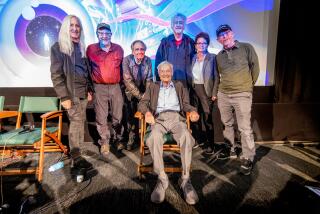Winning Ways of a Loser
- Share via
PRAGUE, Czech Republic — He’s a hapless genius, a self-taught gynecologist, an explorer, a mathematician, inventor of the “notorious triple hammer.” He seems maddeningly real, but he is imagined, flitting like an elusive moth through stories and plays that have made him the people’s choice for the greatest Czech of all time.
Meet Jara Cimrman. A gray-bearded man in tweed, or so they say, he has the intellect of Albert Einstein and the haphazard charm of Mr. Magoo. And, if we may linger on his personality a bit more, he’s the quintessential Czech underdog, the enigmatic patriot in a small country whose sardonic humor is born of a history of being conquered and oppressed.
But, as Cimrman might suggest, we must not digress before we start, so let us begin. Created by writers Zdenek Sverak and Jiri Sebanek, the Cimrman myth recounts the life and adventures of a bumbling and slightly-off-the-mark intellectual. Example: Cimrman invents the lightbulb but doesn’t make it to the patent office on time. Or, musing in his journal, he writes: “I’m such a complete atheist that I’m afraid God will punish me.”
Discovered “documents” about his life were first mentioned on a radio show in 1966. Since then, Cimrman’s exploits and self-deprecating humor have resonated with Czechs. Plays about the character, seldom seen and mainly conjured by imaginary academics who extol his feats, unfold in the Jara Cimrman Theater, where fans wait in line for hours to buy tickets. A movie has been made about him, a pub bears his name, and a museum of Cimrman’s inventions sits on a hill overlooking Prague.
In a recent television poll, Cimrman was picked as the greatest Czech of all time, beating out the likes of religious reformer Jan Hus, literary icon Franz Kafka, former President Vaclav Havel, Good King Wenceslas and a bunch of other nobles and knights dotting Bohemian history. Ultimately deciding that the national hero should be more substantial than a dreamed-up Renaissance man, the television station gave Cimrman his own category and Emperor Charles IV (a real 14th century king, with a sword) was selected as the country’s most revered historical figure.
“Czechs have a tradition of not taking things too seriously,” said novelist Ivan Klima, sitting recently in his sunlit home on the outskirts of Prague. “Why? Maybe it’s the philosophy of a nation that was never free. We’ve been dominated by the Austrians, the Nazis and the Soviets. In 400 years of history, we have been a free society for only 35 years.... Cimrman is in this tradition. We’ve had a lot of famous Czechs in science and the arts, but Cimrman is our response not to” inflate ourselves.
An idiosyncratic and lovable wanderer who never quite achieves greatness, Cimrman embodies the inventive spirit. He is a character of head-scratching logic, a phantom stitched into history’s epochal moments like an uninvited, yet intriguing, party guest. Born sometime between 1857 and 1867, he’s ubiquitous in the late 19th and early 20th centuries, popping up when Guglielmo Marconi invents radio, giving composer Johann Strauss advice on music, introducing a young Pablo Picasso to Cubism with his painting “Still Life With Dice.”
Destiny, however, toys with him. Cimrman missed discovering the North Pole by seven meters. Such failures could turn a man into a pessimist, but Cimrman perseveres amid a swirl of riddles and one-liners spun out in plays and skits: “A warm beer is worse than a cold German woman.” “Man is born to his own detriment.”
He is not overtly political, but his misadventures and intellectual charm endeared him to thousands of Czechs during the Cold War.
“Cimrman started out as a joke on ideology and science. He played an important role during the communist regime,” said Jirina Siklova, a writer and former dissident. “Through him, it was possible to make jokes not just on science but on the ideology of the communists.” Cimrman remains a bit of escape for today’s Czechs who are insecure that “democracy may not be a paradise from our troubles,” she said. “But through him we are still able to laugh.”
Jan Kolar, editor of Prague’s Theatre Gazette, said most people believed that Cimrman would be “intellectual fun that would last two or three years.”
But after the Soviets and their allies put down the liberalization movement of 1968, Kolar said, “something happened and the Jara Cimrman Theater became the most popular in the country....The theater didn’t directly criticize the regime, but they touched something important in the Czech soul.”
It seems Czechs -- among the most godless and skeptical people in Europe -- prefer fiction to flesh and blood when pondering reality. Consider the dark fables of Kafka or the absurdist plays of the lyrical Havel, voted into the presidential castle after helping the nation defeat communism. And in the 1920s, there was the Good Soldier Josef Svejk, a make-believe grunt drafted into the Austro-Hungarian army whose escapades revealed the ridiculousness of war and those who instigate it.
Cimrman has his own thoughts on conflict. His biography, posted on the Internet by devotees known as “cimrmanologists,” states that while chopping wood in 1903, “Cimrman conceived the idea of total European disintegration. He realized that most wars are caused by big nations wanting to be even bigger and concluded that a Europe consisting of tiny little microscopic nations would be absolutely safe.”
Sverak, one of Cimrman’s creators, was amused that his character received so many votes in the greatest-Czech contest. He speculated that Cimrman won because Czechs wanted to show the “silly” nature of such polls. “I would describe Cimrman as a loser,” Sverak said. “And we, a small country, are also losers. Such a figure could never be [found in a] nationalistic nation.”
Cimrman’s story, discovered, so it is said, in a trove of papers hidden in the wall of a summer home, begins in the mid-19th century, when the Czech Republic was part of the Austro-Hungarian Empire, and ends when he mysteriously disappears during the buildup to World War I.
“It was a time when the world was not aware of world wars, a time of big inventions,” said Sverak, writer and star of the 1996 film “Kolya,” which won the Oscar for best foreign-language film. “For example, Alfred Nobel invented dynamite. His idea was for it to help miners, not to kill people. Inventors wanted to find something new. They wanted to fly, to be like birds and not have their planes bomb people. It was a magical, ingenious time. And that’s why the last information we have about Jara Cimrman is in 1914.”
He was a moth who fluttered away before the light went out. Some say he emigrated, others suggest he was assassinated and a few believe he was abducted by aliens.
All that’s left to keep the Cimrman legacy alive are his manuscripts. According to Czech Radio, Sverak and a circle of actors and writers have produced 14 Cimrman comedies over the years, including the most recent, “Africa.” The plays have a similar rhythm: The first act is set amid lectures on Cimrman’s discoveries and the second is a tale or skit purportedly written by the great Czech.
On a muggy night not long ago, a waiter in a blue apron poured beer in the Cimrman Pub, a stone cavern where the sound of traffic fades. Young women who might liven up the place had yet to arrive; intellectuals were scarce, although there was a solitary figure draped over a book in the corner. The Cimrman Theater next door was closed. The troupe had taken the show on the road.
“It’s a pity Cimrman wasn’t allowed to be selected the best Czech in history,” said the waiter, Tomas Janik, sensing, as many Czechs do, that the contest was rigged -- another conspiracy from above. “Cimrman’s exactly the person who should win. Humor is the only correct way to act in life.” A couple strolled in and sat against the wall. Janik drew two beers, the glasses sweaty in the heat.
“You know,” he said, “everyone knows Cimrman, but many don’t know the exact Cimrman story. Some people even think he’s a real guy. No one would see himself or herself as Cimrman. There’s so much metaphor and hyperbole. It’s just not possible.”
Who, after all, could be known for discovering the snowman, co-designing the Panama Canal and advocating driving in the middle of the road? How many other Czechs have a museum dedicated to them that features inventions such as a famine spoon, with its hole in the middle, a hot potato holder, a case for lucky fish scales and the triple hammer, able to drive or extract three nails simultaneously?
Janik wondered how Cimrman’s distinctive voice, honed for decades mainly by Sverak, now in his late 60s, will survive when he and the writers are gone. “They are the best Czech humorists -- no one else can do Cimrman,” he said. “When they stop, it won’t carry on.”
Others believe that Cimrman, whose motto was “It’s better to begin eternally than to finish once and for all,” will always be there, a comical ghost in the wings, a twist of humor when things get too serious.
*
Special correspondent Marie Drapalova contributed to this report.
More to Read
The biggest entertainment stories
Get our big stories about Hollywood, film, television, music, arts, culture and more right in your inbox as soon as they publish.
You may occasionally receive promotional content from the Los Angeles Times.











